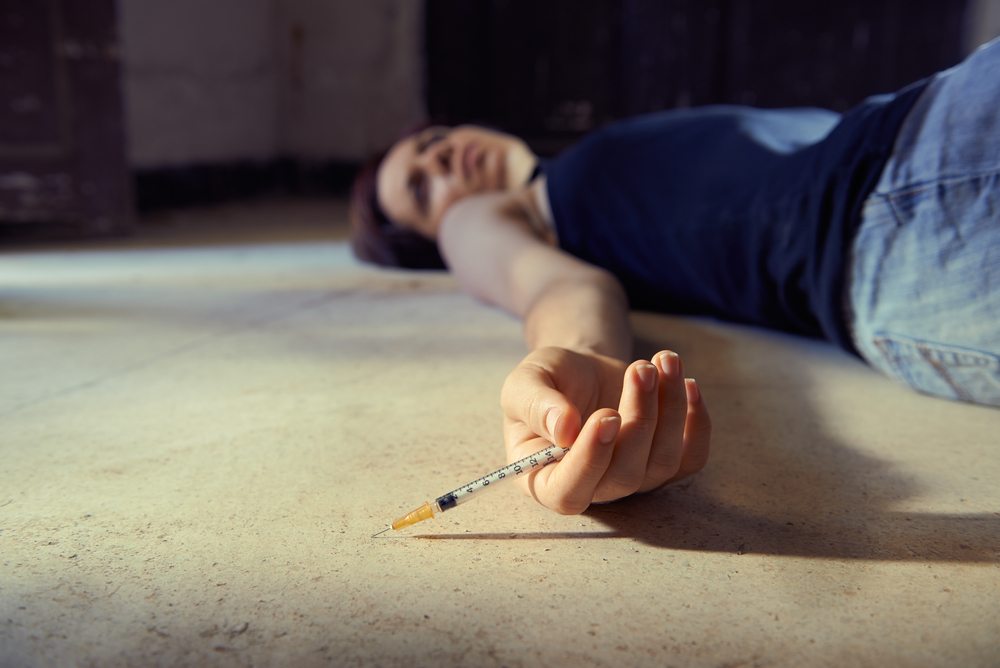Because heroin is incredibly addictive, becoming addicted to heroin can happen very quickly. Heroin is a street drug that’s synthesized from Morphine, a highly addictive painkiller that’s often used in hospitals after surgery or traumatic injury. Morphine is commonly used in patients with severe pain, as it’s one of the stronger opioids.
However, while many people become addicted to opioids because of a prescription, some start taking heroin after using other types of drugs or to fit in. How an addiction starts greatly depends on the person, and there is no specific timeline for developing an addiction.
Can You Get Addicted to Heroin After One Use?

Though heroin is highly addictive, it takes repeated use to become physically dependent or addicted to a drug. Addiction happens when the body and brain become used to feeling a certain way because of the drug. When the drug is taken away, the user experiences withdrawal symptoms, a tell-tale sign of addiction.
While physical dependence on heroin cannot occur after one use, many people who use heroin become addicted. One sthttps://nida.nih.gov/publications/research-reports/heroin/overviewudy showed that one out of every four people who tried heroin for the first time became addicted.

How Heroin Addiction Starts
Many people become addicted to heroin because of prescription opioids. The opioid epidemic is a huge problem in the United States, as many physicians over-prescribe these drugs, allowing their patients to become dependent on the drug. Once that dependency starts, the prescription is often revoked or out of refills, causing patients to turn to unsafe methods of getting the drugs they need, such as using heroin.
Many studies show that those using injectable heroin can be linked to an opioid prescription in the past. Whether they used their opioids as recommended or abused them is unknown. Even those who don’t abuse prescription opioids and instead use them exactly as directed can become addicted.
The only way to prevent addiction to prescription opioids is to avoid taking them or to only take them only when absolutely necessary. The most common prescription opioids include Vicodin, Percocet, and OxyContin. While Heroin is made from Morphine, Morphine is very rarely prescribed to patients.
Warning Signs of Heroin Addiction
If you’re worried that a loved one has become addicted to heroin, you may want to be on the lookout for some common warning signs. If you’ve tried heroin once or twice and you’re worried about becoming addicted, look for these warning signs in yourself. If you can recognize your behavior and stop it before addiction occurs, you’ll be saving yourself a lot of damage to your body, as well as a lot of money.

The warning signs of becoming addicted to Heroin and use are often similar to the warning signs associated with the use of other drugs. If you’re worried your loved one may be using a drug of some kind, try to speak with them about it.
Warning signs of heroin addiction and use include:
- Bloodshot eyes
- Sudden weight loss
- Changes in appearance
- Financial problems
- Extreme drowsiness
- Secretive behavior
- Constricted pupils
- Depression
- Severe itchiness
- Nausea
- Vomitting
- Collapsed veins
- Shortness of breath
- Slurred speech
- Paranoia
Dangers of Heroin Addiction if Left Untreated
Heroin dependence carries a very serious threat of overdosing, which can be lethal. Heroin is a powerful opioid that can reduce breathing and heart rate, resulting in passing out and even demise. There is also a high risk of severe health concerns due to heroin use. This could involve vein collapse, abscesses, and bacterial illnesses like endocarditis, which is irritation of the inner layer of the heart. In addition, heroin can damage the liver, kidneys, and lungs and raise the odds of catching illnesses like HIV and hepatitis C.
Heroin dependence can also have substantial psychological and social effects. Using heroin can bring about depression, tension, and other mental health issues, in addition to difficulties with relationships and jobs. Furthermore, heroin addiction can prompt monetary issues, as the expense of the medication can be noteworthy. Moreover, heroin dependence can cause legitimate issues, as it is illicit to possess or use the drug. Addiction to heroin can likewise prompt social segregation since the person may need to remove themselves from their family and companions, so as to keep using the drug.

Why Heroin Addiction Treatment is Important
The National Institute on Drug Abuse (NIDA) has estimated that in 2018, there were 926,000 people in the US with a heroin use disorder. Additionally, the figures indicate that fatalities associated with heroin overdose have been on an upward trend in recent years, with a fivefold rise from 2002 to 2018. In 2018, heroin usage was linked to 15,482 overdose deaths. Expert treatment for heroin abuse is critical as it takes into account the multifaceted physical, psychological, and social elements of the addiction. Without treatment, it can be hard to overcome heroin addiction, and the odds of experiencing serious health issues, overdose, and death are amplified.
When to Seek Treatment
If you or someone you love has been using heroin or has a heroin addiction, it may be time to seek treatment. There are many treatment options available to you or your loved one, such as outpatient treatment, detoxification, partial hospitalization programs, and more.
To learn more about these programs and how they can help with you or your loved one’s heroin addiction, call Asheville Recovery Center today. We’re eager to answer any questions you may have and help you or your loved one on the path to recovery.






